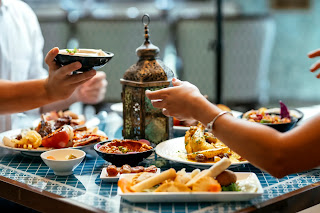Why do Indians sacrifice so much for Ramadan?
Most of you probably have heard of Ramadan, you may even know someone who practices it... In my case, I got to know Ramadan thanks to a friend. Last year, at school, I saw that she hadn't bring her lunch (as she usually did). When I asked her, she told me she was practicing Ramadan. I had never heard of it, and it really caught my attention. I found fascinating how Muslims give up everything (food, water...) just for a celebration. As this date approaches, I thought it would be interesting to "dig" a little.
Let's start with the basis. Ramadan is the ninth month in the Muslim lunar calendar. Usually, it lasts between 29 to 30 days depending on when the new moon is sighted (a lunar month). If the moon is not seen on the night of the 29th day, then Ramadan lasts for the full 30 days. This year, the celebration begins in the evening of April 2 (Saturday), and ends in the evening of May 2 (Monday).
The Prophet Mohammed said, "When the month of Ramadan starts, the gates of heaven are opened and the gates of hell are closed and the devils are chained."
Muslims believe it was during this month that God revealed the first verses of the Quran, Islam's sacred text, to Mohammed, on a night known as "The Night of Power".
In Ramadan, Muslims aren't allowed to eat or to drink water from dusk until dawn. They also abstain from smoking or having sexual relationships. Doing any of those things "invalidates" your fast for the day, and you just start over the next day. To make up for days you didn't fast, you can either fast later in the year (either all at once or a day here and there) or provide a meal to a needy person for each day you missed. Fasting is not mandatory for Muslim children until they reach puberty, usually between the ages of 10 and 14 for girls, and 12 and 16 for boys. While inmoral acts and anger are forbidden in Ramadan, acts of worship such as praying, reading the Quran or charity are encouraged. Some people may find this tradition as too much effort or sacrifice, but for Muslims, it is a time of celebration and joy, to be spent with loved ones.Muslims fast as an act of worship, a chance to get closer to God, and a way to become more compassionate to those in need. They find Ramadan as a time of spiritual discipline, where they can purify their souls and bodies.
So... what's a day in their life like? During Ramadan, Muslims wake up before dawn to eat their first meal of the day (which should be filling enough to last until dusk). At dawn, they perform the morning prayer, and normally go back to bed afterwards. They attend their jobs and schools as in any normal day. At dusk, the evening call to pray is made, and they break their fast. At this time, they normally have a light meal called an iftar (literally "breakfast") before performing the evening prayer. This is usually followed by a larger meal a bit later in the evening. Then it's off to bed for a few hours of sleep before it's time to wake up and start all over again.
The religious festival Eid al-Fitr, or the “Festival of Breaking the Fast,” is one of two major holidays celebrated by Muslims around the world. It commemorates the end of the fasting month of Ramadan, and it's an occasion for special prayers, family visits, gift-giving and charity (just like Christmas!). it takes place over one to three days, beginning on the first day of Shawwal, the 10th month in the Islamic calendar.



Comments
Post a Comment